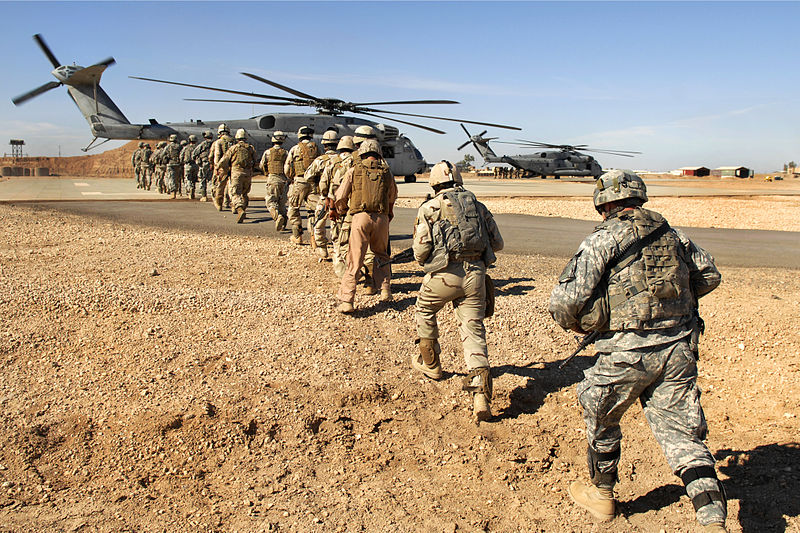Should the West intervene in the Middle East against the Islamic State (IS)? Should we send troops, provide assistance or money, or should we isolate ourselves and let the people and nations of the region sort it out on their own? And what exactly is the liberal standpoint? To this latter question the answer is simple: There is no liberal standpoint. We are diverse in our opinions, there are justifiable liberal arguments for, as well as against a military intervention in the Middle East. The following article – which perhaps, not unlike this paragraph, raises more questions than answers – is simply my personal view on the issue.
There is an ongoing debate about the level of intervention against IS. The Western World (by which I mean a broad set of values rather than a geographical location) is once again pondering sending troops to the Middle East, or to be more precise in the case of some countries, sending more troops. In Hungary, there is a plan of sending 150-300 troops to the region to help out with the fight against IS. Although the Hungarians would only undertake guarding and protecting duties, there are well-based pro and con arguments on the need of military intervention.
It is beyond doubt, that something must be done with the Islamic state and it better be done quickly. The barbarities committed by the IS terrorists under the false pretenses of defending religion must be met with due force. The IS must be destroyed. I don’t think there are any doubts about that. However, the best way of achieving this is debatable. Iraq and Syria and the entire region got destabilized as the consequence of wars in the area. The persisting anti-American sentiments, as well as an unfortunate ramification of the conflicts, helped the Islamic State gain strength. Another extensive military operation can also carry the dangers of inciting further conflicts in the long run.
The last war in Iraq achieved its primary objective of overthrowing Saddam Hussein, however it failed to stabilize the country. Troops cannot coerce people into identifying with a set of values or embracing a new regime. Military force can treat the symptoms of a problem but not solve the deep underlying issues on. The question therefore lies in implementation. Will the military aid something else, or will it try to solve the problem by brute force? We are at risk of waging yet another Iraq war (although the locations shifted somewhat) with its full ramifications. Without a proper exit strategy the military will weaken or might even destroy the IS, but something else, something dangerously similar, may emerge in its place.
The whole strategy of waging war in a non-neighboring country, and without the intention of colonization, is a relatively new phenomenon in history. Fighting against insurgents and not a proper military is even newer. The doctrine and tactics of such warfare lack experience and prospect as to its long-term implications. More research should be conducted to look into the viable options for the time after defeating IS, lest we fall into the same trouble we did with the last Iraq War – namely that troops got pulled out from an unstable situation. Regardless of the necessity of the Iraq War, recalling troops with the job half done will only worsen an already bad situation. The people of the West will not tolerate yet another long-lasting war which will result in withdrawing the military earlier than necessary. On the other hand, swift and short military engagements will not yield in satisfactory results in the long term either.
Another problem is the already negative image of the West in the Middle East. More military intervention will further antagonize us, playing right into the hands of the IS or other combatant groups. The continuous failure to understand the region has already caused a lot of distress to the West but a realization is yet to come that it is virtually impossible to fully understand the situation. It is not out of ignorance, inability or lack of intelligence but simply because there are thousands of local issues that can be fully understood and handled only on a local level. There are several differences between groups, there are religion tensions between the Shia and the Sunnis and even within their ranks there is no concord.
For all these reasons it would be the best to leave it to the military of the neighboring countries to sort the situation out. They are more directly involved, and it is their interest as well to destroy the Islamic State. Whereas it is also the interest of the West, for the long-term stability of the region it would be far more beneficial to help these countries fight IS without us getting directly involved. Even the news of direct involvement discouraged many fighting groups form continuing their struggles against the Islamic State, because they didn’t want to associate themselves with the US. Only if these countries fail to handle the issue should the West – with a well-established exit strategy – intervene with its military. To answer the questions of the first paragraph, it all depends on the willingness of the region to sort its problem out and our preparedness to take serious risks in the Middle East yet again.



